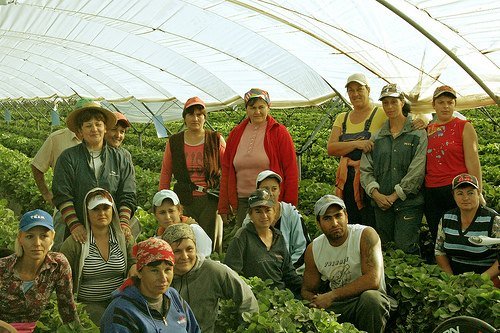By Diana Sala
Coming from Latin America in a plane to Spain, I talked to the person sitting next to me. He turned out to be a temporary worker for the agricultural industry in Spain. Wondering about the type of visa he could hold as a temporary worker in Spain (not being from a country member of the EU), this person explained it was part of an international agreement between the two nations.
The scheme is called circular migration and refers to a system where people residing in low and middle income countries go to a high income country temporarily on the condition that, at the end of the period, they must re-establish residence in their country of origin. According to OSCE (Organisation for Security and Co-operation in Europe), Spain has signed agreements for temporary worker programmes with a various countries, including Ecuador, Colombia, Morocco and Romania.
Circular migration is a fancy name for the “temporal importation of cheap labour” to work in the agri-industry business in Spain. The programme benefits companies since they have fewer responsibilities to employees under a temporary contract – e.g. no contribution towards pension or health services. The host country is also exonerated of social welfare obligations since the workers are not citizen of that country.
On the other hand, temporary workers spend long periods separated from their families, in isolated conditions. They pay for their flights, accommodation, food and a penalty fee if they decide to leave the place before the time they have agreed in their home countries.
The working and living conditions described by my flight mate were:
-Working from Monday to Saturday from 8am to 6pm or to 9pm during summer time. -Occasional work on Sundays can be offered to them: “It is optional, but they don’t like it if you say: no”.
-The payment is around €4 the hour.
-Facilitates for accommodation are rented to the workers, who are also responsible for cooking their food.
-If a person wants to drop out they have to pay a fee.
-Workers pay a health insurance, as well as their plane tickets to and from Spain; this is discounted from their payment.
Similar schemes exist in various countries: Austria, Canada, France, Germany, United Kingdom and United States; in every country policies change providing more or less protection to the seasonal workers, for example limiting the work permit to 6 weeks, providing tickets, free accommodation or heath service. But all the programmes focus specially on avoiding migratory possibilities from the temporary workers to the host countries or dual citizenship.
Asking this person about what places of Spain he knows, I found out that with that wage and working hours the possibilities to travel narrow down for workers sending money back home and saving up for the months ahead in their native countries. “I go out about three times during the months I work here – they can work up to 9 months – but some people go out even 6 times. I cannot afford that, the time you are travelling, means money you don’t get, and in addition you are spending money. It is too expensive”. Lack of opportunities in his home country combined with months of intense work, isolation and exclusion in the host country, was the pervading feeling in the conversation.










